Head
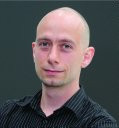
Jaroslav Hlinka is the Head of the Department of Complex Systems at the Institute of Computer Science, Czech Academy of Sciences and also the Chair of the Institute's Council. His research interests lie in developing and application of methods for data-driven analysis of real-world complex systems, with main focus on human brain.
Scientists
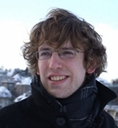
David Hartman is working on problems concerning complex networks with regard to reliable construction as well as emergence of stuctural phenomena. The corresponding application domains includes those in neurological research or climatology. Another reseach domain is analysis of symmetrical relational structures and particularly graph or colored graphs possesing ultrahomogeneous or homomorphism-homogenous property.

Pavel Sanda research focuses on modeling dynamics of biologically inspired neural networks. That includes both simple sensory circuits and more complex networks involved in coordinated activity of cortico-thalamic loop, neuromodulation of large networks as well as the rules which govern synaptic plasticity between the neurons in the modeled circuitry.

Helmut Schmidt’s research focuses on computational techniques to understand and reproduce the dynamics of biological neural networks, ranging from small-scale networks to the entire (human) brain. While the mainstay of this effort is computational modelling of neuronal circuits, he is also interested in developing new methods for time series analysis, especially model-based data analysis. Applications encompass neuronal information processing (working memory, language acquisition) as well as disorders of large-scale neuronal networks, especially epilepsy.

- Stella Maris Sanchez, Ph.D.
Stella M. Sanchez has a PhD in physics with focus on multimodal neuroimaging techniques. Her main research interests include structural and functional brain connectivity on healthy subjects but also on patients with mental disorders, tractography and MRI physics. Currently, Stella is working on brain modelling and developing strategies to combine this with her experience in neuroimaging to study brain dynamics.
- Nikola Jajcay, Mgr., Ph.D.

Nikola Jajcay is a computational neuroscientist focusing on biophysically realistic population models and heterogeneous whole-brain modelling. Besides the main focus, his research interests include causality in complex systems, biostatistics, data science & Bayesian approaches.

Gorka Zamora-López holds a Ph.D. in physics. His research lies at the crossroads between computational neuroscience, complex networks and dynamical systems, making both theoretical and practical contributions. He combines the analysis of brain signals with models of neural activity to investigate brain function and dysfunction, e.g. due to disease or brain lesion. His main goal is to study the brain as a biological computational "machine", and thus try to understand how the brain learns, coordinates and processes information of various classes and spatio-temporal scales.
Postdocs
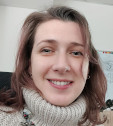
Anna Pidnebesna is working on modeling and analysis of real-world complex systems. Her main work is connected with developing and applying data analysis methods, frequently using connectivity matrices and sparse linear approaches. The human brain investigation is the main application part.

- Shih-Cheng Chien, Ph.D.
Shih-Cheng (Vincent) Chien's research is centered around computational modeling aimed at unraveling the intricacies of cortical microcircuits and their role in supporting essential brain functions, including sensory processing, deviance detection, attention, and working memory.

- Dominik Klepl, MSc, Ph.D.
Dominik Klepl holds a PhD in data science, specialising in graph learning to model neuroimaging data. His primary research interest is leveraging machine learning and deep learning techniques in computational neuroscience and psychiatry. Additionally, Dominik is interested in explainable artificial intelligence, graph inference and data science.

- Wojciech Goch, Ph.D.
Wojciech Goch holds a PhD in biology, and specializes in theoretical models of molecular biochemistry. His main research interests are 3D reaction - diffusion models, dynamic models of enzymatic pathways in neuronal networks and time series analysis. He has also experience in a wide range of research topics including modeling and validation of spectroscopic data, statistical analysis of clinical data and application of Machine Learning methods in geoinformatics.
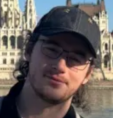
During my PhD obtained in 2024 in computational neuroscience, I had the opportunity to study neuronal excitability from a mathematical, computational and experimental point of view. In this context, I was able to specialize in the slow-fast study of ODE, in the continuation algorithm applied to experiments, but also the application of protocols on a Patch-Clamp setup.

- Joakim Skarding, Ph.D.
Joakim Skarding holds a PhD in data science, with a focus on Dynamic graph neural networks. His research interests include deep representation learning on temporal graphs and time series and applications of machine learning in computational history. He also has industry experience as a software developer.

- Harrison Watters, Ph.D.
Harrison Watters holds a BA in biology and a PhD in neuroscience. He is currently focused on variations in the intrinsic spatiotemporal patterns of the default mode network and other large-scale functional brain networks, and how they relate to the allocation of attentional resources, executive function, and the generation of coherent experiences of consciousness and social narratives. His current methods include complex principal components analysis and dynamic sliding-window analysis of fMRI datasets of smartphone addiction, psychedelics, and schizophrenia.

- Filip Novický, Ph.D.
Filip Novický holds a PhD in Computational Neuroscience. His current research focuses on developing methodology for investigating spontaneous activity patterns in human electrophysiology data during psychedelic states and sleep. Filip employs advanced signal processing techniques to solve spatial and temporal alignment problems to reveal the spatiotemporal properties of neural propagation.
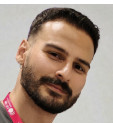
- Christos Stergiadis, MSc
Christos Stergiadis holds a PhD in Electronic Engineering and specializes in network analysis of human electrophysiological data. His primary research interest lies in the application of functional connectivity and graph theory to EEG and intracranial EEG recordings from epilepsy patients. He is currently investigating how network topology at high frequencies can inform the localization of the epileptogenic zone and the prediction of surgical outcomes in drug-resistant epilepsy.
Visiting Researchers
- prof. Kenneth Hugdahl, Ph.D.
- doc. PhDr. Radim Kočandrle, Ph.D.
- doc. Mgr. Zdeněk Kratochvíl, Dr.
- Mgr. Dominika Grygarová, Ph.D.
- Mgr. Marek Havlík, Ph.D.
- Mgr. Lenka Ambrožová
Ph.D. Students
- Isa Dallmer-Zerbe, Mgr.
- Stanislav Jiříček, Ing.
- Lucia Jajcay, Mgr.
- Ying Jing, M.Ed.
- Karolína Volfíková, Ing.
- Nina Reščič, MSc
- Dávid Kubek, Mgr.
- Joana Dos Santos Pombo Belo Jorge, MSc
- William Lízr, MSc
- David Beinhauer, MSc
Research Assistants
- Madhurima Bhattacharjee, Ph.D.
- Jakub Svoboda, Ing.
- František Szczepanik, Bc.
- Kryštof Bořkovec, Ing.
- Davide Todde, MSc
- Saket Kumar, MSc
- Kryštof Průša, Bc.
Project Coordinator
- Magda Pokorná
Alumni
- Arthur Matsuo Yamashita, Ph.D.
- Luigi Caputi, Ph.D.
- Michal Hadrava, Ing.
- Alberto Pérez, Ph.D.
- Jacob Billings, Ph.D.
- Bc. Filip Blaštík (as graduate student)
- Nicola Cinardi, Ph.D.
- Katarína Studeničová, Ing.
- Kopal Jakub, Ing., Ph.D.
- Barbora Rehák Bučková, Mgr.
- Jan Papp, Ing. (as graduate student)
- Jakub Kořenek, Ing., Ph.D.
- Giulio Tani Raffaelli, Ph.D.
- Katarzyna Kazimierczak, Ing., Ph.D.